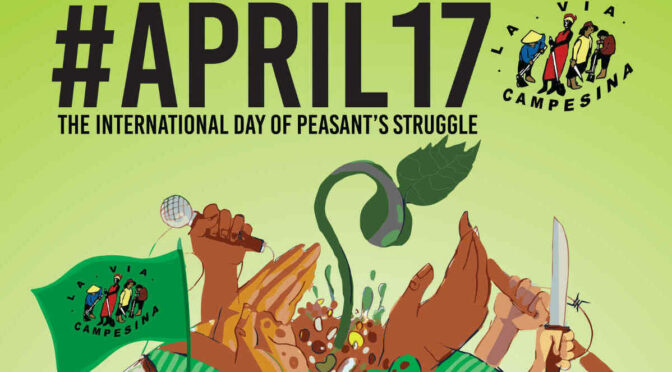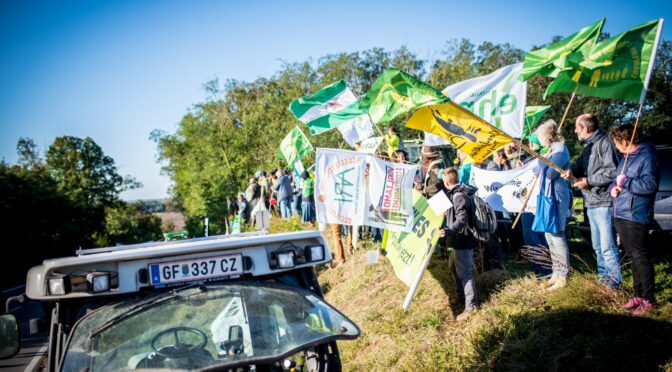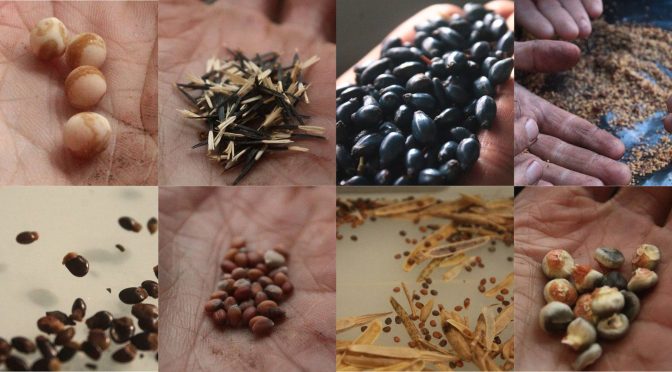Hoje dia 17 de Abril, assinala-se o dia internacional das lutas camponesas, em memória dos 19 trabalhadores rurais sem terra assassinados em plena luz do dia por forças policiais precisamente há 25 anos no estado brasileiro do Pará. Este dia que ficou conhecido como o massacre de Eldorado dos Carajás, marcou o inicio da luta global pelos direitos dos camponeses, pelo acesso à terra e recursos produtivos e pela realização da soberania alimentar. Neste dia relembramos também todas e todos os camponeses/as e trabalhadores/as rurais que em Portugal lutaram pelos seus direitos e foram mortos ou perseguidos às mãos do fascismo. E os que hoje resistem contra os avanços galopantes do capitalismo nos campos. Para assinalar este dia de Primavera Agroecológica, falámos com camponesas e camponeses em zonas de expansão da agricultura industrial, que nos falam dos seus impactos e resistências.
Monthly Archives: April 2021
La Via Campesina e outras organizações apelam no dia da luta agrária à defesa dx agricultor/a camponês/a, uma espécie em extinção
Carta Conjunta à Comissão Europeia: Uma visão comum para a diversidade das plantas cultivadas
15 de Abril de 2021
A presente carta, em inglês (com tradução em francês e castelhano), foi entregue hoje ao Vice Presidente da Comissão Europeia e os Comissários respectivamente para Saúde e Segurança Alimentar, Agricultura, e Ambiente, Oceanos e Pesca, denuncia a uniformização e burocratização das sementes de cultivo que regem as actuais regulamentações para plantas e sementes e que ameaçam a agrobiodiversidade bem como os direitos dxs agricultores e consumidores a terem acesso a sementes locais e/ou biológicas de qualidade.
Joint Letter to the European Commission: A Common Vision for Cultivated Plant Diversity
Dear Executive Vice-President Frans Timmermans,
Dear Commissioner for Health and Food Safety Stella Kyriakides,
Dear Commissioner for Agriculture Janusz Wojciechowski,
Dear Commissioner for Environment, Oceans and Fisheries Virginijus Sinkevičius
In the coming days the European Commission will publish a study on the options to update the existing legislation on the production and marketing of plant reproductive material (PRM)(1). In the context of
possible changes to the legislation, we, as actors of cultivated plant diversity:
representing seed savers, gardeners, farmers, breeders, seed suppliers, food producers, and civil society organisations that value and work with the genetic diversity of cultivated plants;
defining cultivated plant diversity as the diversity of species, varieties, and the genetic diversity within them, and the traditional knowledge associated with their cultivation and use;
working often in parallel as users, developers and producers of cultivated plant diversity;
hereby outline our common vision for cultivated plant diversity in Europe.
(1) The legislation applies to all plant reproductive and propagating material, which will all be referred to as “seeds” in this document.
Why do we need change?
The existing rules for the production and marketing of seeds favour uniformity and short-term productivity at the expense of cultivated plant diversity, the environment, and the diversity of actors developing seeds and making them available. They neglect the right to seeds grounded in international law, in particular the United Nations Declaration on the Rights of Peasants and Other People Working in Rural Areas (UNDROP) and the International Treaty on Plant Genetic Resources for Food and Agriculture (ITPGRFA), and divide actors into artificial categories of “users” and “producers” of seeds. The conservation, sustainable use, and dynamic management of cultivated plant diversity in gardens and in fields can go hand in hand.
In light of the climate and biodiversity crises, we need policies that recognise, protect and support the potential of cultivated plant diversity in order to foster resilient food systems and ensure our future food security. Cultivated plant diversity is the foundation for the ecosystem approaches needed in agricultural production to steer the transition of food systems and reverse biodiversity loss
The Covid-19 pandemic has reinforced this need, putting beyond doubt that diversity is central to healthy ecosystems and healthy diets, and that short supply chains strengthen the resilience of our food production against external shocks. It has also led to a surge in demand for locally adapted open-pollinated seeds and the sourcing of produce directly from the grower. The local breeding, production and dynamic management of seeds, and the diversity of commercial seed supply, provide farmers with high value opportunities to tap into this growing demand, for example by offering organic produce, traditional varieties, neglected and underutilised species, and/or regional specialities
However, the current regulatory framework is failing those farmers and growers who operate outside industrial agriculture, for example farmers working under agro-ecological or certified organic conditions, farmers who want to work with open pollinated seeds, and/or farmers working in small acreages with close ties to final consumers, as they simply lack access to sufficient seeds adapted to their needs and local production environments. In light of the many challenges facing agriculture, it is unacceptable that the seed marketing framework discriminates against farmers and growers who wish to pursue alternatives characterised by environmentally and climate-friendly practices.
Any reform of the seed marketing legislation must advance the European Green Deal, its Biodiversity and Farm to Fork Strategies, and the EU’s climate change targets by promoting farmers’ rights to seeds, and seeds that owing to their genetic diversity facilitate low input, organic, and agro-ecological farming practices. It must respect and support the stimulating developments of the new Organic Regulation, and also recognise the considerable and costly burdens placed on the production and movement of seeds under the new Plant Health Regulation, particularly for smaller operators. It must be consistent with the commitments made under the ITPGRFA, and the Convention on Biological Diversity. Last but not least, it must enforce the right to seeds and the obligations of states to facilitate and respect this right under the UNDROP.
What should this change look like?
There have been some improvements over the past decade, particularly with the directives on amateur and conservation varieties, and more recently in the new Organic Regulation. However, diversity is ultimately still limited to bureaucratic niches, each of which comes with its own set of restrictions, and the complexity of the framework itself is prohibitive for many smaller actors. The climate and biodiversity crises, as well as the societal, economic and technological changes in the decades since the rules were adopted in the 1960s, demand a fundamental rethink.
A reformed seed marketing legislation must support, rather than discriminate against, intra-specific and intra-varietal diversity, thereby supporting adaptation to climate change, the transition to a more climate and environmentally friendly agriculture, local seed and food production, farmers’ rights, and healthier diets. It should also truly recognise and support the multiplicity of seed systems, and offer more choice to the full spectrum of farmers and grower.
To achieve this aim, any reform must recognise, protect and reward the pivotal role played by informal seed systems in the conservation, sustainable use and dynamic management of on farm and in garden diversity, and in ensuring the resilience of our food systems. It must ensure the participation, collaboration and representation of all types of farmers, breeders, consumers, and other actors of the food chain in upstream research projects and at all levels of decision-making. In parallel to the seed marketing legislation, the granting of intellectual property rights must not harm the right to seeds. All relevant legal frameworks and their implementation must be improved to avoid the misappropriation of diversity, in particular of unregistered cultivated plant diversity, including using digital sequence information.
Specific Proposals for a Possible Reform of the Seed Marketing Legislation
In light of the study on the seed marketing legislation that was requested by the Council of Ministers in November 2019 and will be published by the European Commission in April 2021, we outline the general principles that should find echo in the legislation:
The scope of the seed marketing legislation should be delineated by a strict definition of seed marketing limited to commercial activities targeting professional seed users. The seed marketing legislation should not in any way regulate the on farm and in garden conservation, sustainable use and dynamic management of cultivated plant diversity, including seed exchanges between farmers and gardeners that are either for free or only charge reimbursement of expenses. In particular, there should be no register of operators. Peasant seed systems, as enshrined in the UNDROP, must be out of scope of the seed marketing rules.
The seed marketing legislation should provide freedom of choice for farmers and growers, both with regard to seeds (species, varieties, populations) and with regard to production standards.
There must be a clear distinction between the regimes granting intellectual property rights over new plant varieties and those allowing access to the market. Registration based on DUS and VCU testing, when chosen, needs to be adapted and proportionate to the needs and realities of the diverse range of breeders, developers, and maintainers, as well as their customers.
The legislation should ensure transparency over breeding methods and intellectual property rights for all seeds placed on the market.
Rules on seed health and quality control mechanisms should be adapted to the health risks and to the specific circumstances and scale of seed marketing, acknowledging the diverse expectations of seed users and customers with regard to seed quality criteria.
Signatories:
EU / REGIONAL
Demeter Federation
Demeter Czech & Slovakia
European Coordination Via Campesina
Reseau Meuse-Rhin-Moselle
AUSTRIA
Arche Noah
ÖBV-Via Campesina Austria
BELGIUM
Boerenforum
Vitale Rassen
CROATIA
Biovrt-u skladu s prirodom – Biogarden – in harmony with nature)
Croatian Organic Farmers’ Associations Alliance
Život – Association of Croatian family farms
ZMAG – Community Seed Bank
CZECH REPUBLIC
Permasemnika
DENMARK
Demeterforbundet i Danmark
Frøsamlerne – Danish Seed Savers
ESTONIA
Maadjas – Estonian Seed Savers
FRANCE
Demeter France
Mouvement de l’Agriculture Bio-Dynamique
Le Réseau Semences Paysannes
GERMANY
Dachverband Kulturpflanzen- und Nutztiervielfalt e.V.
Getreidezüchtung Peter Kunz
ProSpecieRara
GREECE
Aegilops
Peliti
HUNGARY
Magház – Seed House
IRELAND
Irish Seed Savers Association
ITALY
Associazione per l’Agricoltura Biodinamica in Italia
Demeter Associazione Italia
Rete Semi Rurali
LATVIA
Latvian Permaculture Association
LUXEMBOURG
SEED Luxemburg
MALTA
Nadir for Conservation
NORWAY
Biologisk-dynamisk Forening – Biodynamic Association Norway
POLAND
Foundation AgriNatura for Agricultural Biodiversity
PORTUGAL
GAIA – Environmental Action and Intervention Group



